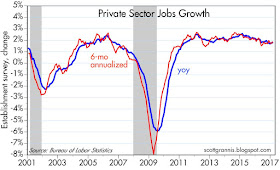The chart above compares the monthly change in private sector jobs, as calculated by the BLS and ADP. Lots of noise, but no change in the long-term trend.
The chart above focuses on just the change in private sector jobs as reported by establishments. The best we have seen in recent years are months in which jobs grow by upwards of 250K per month. But in the past 12 months, jobs growth has averaged 178K, and in the past six months 189K. Those are ho-hum numbers.
One bright spot is that the growth of the labor force (those working plus those looking for work) has picked up modestly over the past year or so. But there are still upwards of 10 million people (potentially) who have "dropped out" for a variety of reasons.
As the chart above shows, private sector jobs are rising at a 1.6% - 1.9% annual rate. We're going to need to see several months of over-225K jobs growth before getting excited about a pickup in the economy.
The chart above shows the labor force participation rate (the labor force divided by the total working-age population), which looks to have stopped declining. That's good news, but it's going to have to start rising by a meaningful amount if the economy is to grow by more than 3% a year.
In any event, today's jobs number shouldn't deter the Fed from raising short-term rates to 1% next week. The Fed is still in "normalization" mode, and it's going to be a long time before monetary policy becomes "tight." The bond market is happy with the idea that rates are going to rise. Continued growth in the economy coupled with rising confidence fully justifies a Fed rate hike.






Scott;
ReplyDeleteThanks for the posting, but your last sentence caught me by surprise.
How can the bond market be "Happy" with rising rate?
Yes; it's a sign of a strengthening economy and that's great news for equity.
However, with negative real short term yields, from my point of view, the situation over the last 8 years or so has been something like nirvana for most bond managers. Rising short term rates only eats into that and pushes that market that much close to the end of free money.
1% fed rate means that real rates will continue to be negative, and while this has been anticipated for a while, it's forcing managers to think of new things.
Re "happy" bond market. Perhaps my choice of words was infelicitous, since there have been losses for investors in longer-dated bonds. I think the bond market is resigned to a hike and basically OK with a hike. I don't see evidence of bond market distress: no spike in swap spreads, no spike in the MOVE index ( the bond market's equivalent of the Vix index). MOVE has in fact been trending down since mid-November, and is below its one-year average. 10-yr yields have risen for a number of days, to be sure, but today they are merely back to the levels of mid-December. Furthermore, the bond market is not expecting a whole series of hikes, or radically accelerating its expectations of hikes. In addition, I think a lot of people have been short bonds for awhile and are happy to finally get some payoff (though not very much of late). Finally, the yield curve has not steepened (1-10 yrs) at all for several months.
ReplyDeleteA good month but plenty of slack in labor markets. In fact, all markets except zoned property.
ReplyDeleteGlobally every industry ready to supply more. Overcapacity in autos for example.
Piles of capital everywhere.
These should be boom times. In fact it should be Full Tilt Boogie Boom Times in Fat City.
Well at least we now know that these new job number are "real numbers" and not "fake" Since the WH is now controlled by the "republicans" (note: not sure that Trump is Republican -- Bannon is certainly not a Republican).
ReplyDeleteAlso enjoyed the use of the word "purge" the US government of those pesky democrates -- let the bleeding commence!
BTW low interest and high interest cannot both be good for the market.
How do you expect REITs and MLPs to react to these forecasted 2-3 moderate rate increases in the year ahead?
ReplyDeleteModerate rate increases and a somewhat stronger economy (both go hand in hand).shoukdnt be a problem for REITs and MLPs, but the market is acting like it will be.
ReplyDeleteScott,
ReplyDeletedid you check the industrial jobs? I can't find them in your article. They almost beat the expectations threefold and tripled. IMO huge news, if it was reflecting re-industrialization of the USA.
Manufacturing employment rose by almost 30K in February, and we haven't seen such strong gains for a long time. But in the previous 12 months, the net gain was only 10K. Given that, it's probably premature to say we're in a new re-industrialization era. The number of manufacturing jobs today (12.4 million) has only just recovered to levels last seen 8 years ago, and they are still far below their all-time high of 19.6 million in 1979.
ReplyDelete